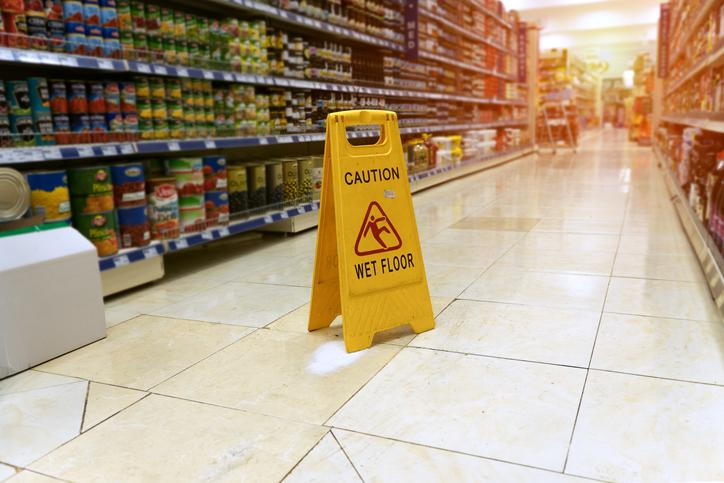
- posted: Apr. 08, 2024
Supermarkets and grocery stores are essential parts of everyday life, providing the food and household items we need. However, lurking among the aisles, floor areas and entranceways is the ever-present danger to customers of slips and falls. In fact, such accidents and resulting injuries occur more frequently in supermarkets than in other retail establishments. When accidents are caused by employees’ failure to exercise reasonable care, the store management can be held liable for damages.
Several factors contribute to the elevated risk of accidents in supermarkets. These are the most common:
Spills —Liquids such as beverages, cooking oils, detergents and cleaning solvents can easily spill onto floors. If not promptly cleaned up, these spills can create slippery or sticky surfaces. Even solid foods like fruits and vegetables can become slipping or tripping dangers.
Crowded aisles— Supermarkets typically have high foot traffic. The more people and shopping carts are moving about, the higher the chance someone might knock something over, spill something or track in water or mud from outside. In addition, aisles are often occupied by employees frequently rotating and replenishing merchandise.
Product displays — Items can sometimes fall off shelves or displays, creating tripping hazards. Additionally, merchandise is often stacked in temporary shelving that can easily be knocked over if not secured properly, which can also lead to accidents.
Wet floors — Supermarket floors are in need of frequent cleaning, but newly mopped floors pose hazards if not cordoned off from shoppers. Melting ice from freezers and refrigeration devices can form puddles. Also, slush and water can be tracked into the store in bad weather.
Flooring material — The type of flooring can contribute to the risk. Highly polished or waxed floors can be slippery. Cracks or missing tiles may pose tripping risks. So can rugs and runners placed at entranceways, which can become frayed or bunched up at edges.
Poor lighting — Inadequate lighting can make it difficult for customers to see spills or other hazards on the floor.
Lack of warning signs — If there’s a spill or wet floor that hasn’t been cleaned up yet, and the store has not put up a warning sign, customers may not notice the hazard.
If you suffer a slip and fall injury due to a store's negligence, you have legal remedies available. An experienced premises liability attorney can assess your situation, gather evidence and help you obtain money damages. You might be entitled to compensation for medical expenses, including hospital stays, surgeries, medication and rehabilitation. If your injury prevents you from working, you may be able to recover compensation for lost income and future earning potential. You may also be eligible for damages for the physical and emotional pain caused by the accident and its aftermath.
Brown, Novick & McKinley Attorneys at Law in Woodbury represents victims of slip and fall accidents throughout southern New Jersey. To schedule a free consultation and speak to one of our highly qualified lawyers, call 866-942-4909 or contact us online.


